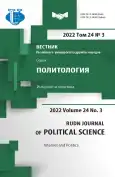Даркнет и политическое
- Авторы: Яковлев М.В.1
-
Учреждения:
- Московский государственный университет имени М.В. Ломоносова
- Выпуск: Том 24, № 3 (2022): Интернет и политика
- Страницы: 408-418
- Раздел: ЦИФРОВОЕ ПРОСТРАНСТВО ПОЛИТИКИ
- URL: https://journal-vniispk.ru/2313-1438/article/view/322609
- DOI: https://doi.org/10.22363/2313-1438-2022-24-3-408-418
- ID: 322609
Цитировать
Полный текст
Аннотация
Даркнет становится все более заметной структурной единицей в политической сфере и вместе с тем пока остается малоизученным участком киберпространства. Поэтому в исследовании ставится цель определить концептуальную призму для его рассмотрения и его актуальное значение в измерении политического. При помощи сравнительно-исторического метода выявляются причины и время политического рождения Даркнета, посредством системного и контент-анализа характеризуются его ресурсы и политическая роль, на основе положений Р. Геля, М. Кастельса, К. Шмитта и др. систематизируются и уточняются понятия власти и политики в Сети. Делается вывод о том, что основным фактором политизации и трансформации Даркнета стала экспансия государств (в особенности автократий) в интернет-пространстве. Давление систем власти и доминирования, нацеленных на поддержание в киберпространстве суверенитета и контроля, вызвало «цифровое сопротивление» программистов и пользователей, стремящихся к свободному обмену данными и конфиденциальности, а также гражданских активистов, желающих избежать преследования за инакомыслие, что обусловило обновление архитектуры и функционала Даркнета, его превращение в альтернативное пространство информационного взаимодействия и базу для наращивания оппозиционного потенциала. Возможностями новой сети для своих целей воспользовался и криминалитет. Основным результатом исследования является тезис о том, что Даркнет трансформируется в особую социально-техническую систему, находящуюся вне сферы международного и государственного права, где все взаимодействия осуществляются только посредством частных соглашений между клиентами, где на основе криптовалют сформирована альтернативная мировая платежная система.
Ключевые слова
Об авторах
Максим Владимирович Яковлев
Московский государственный университет имени М.В. Ломоносова
Автор, ответственный за переписку.
Email: maxvuz@mail.ru
ORCID iD: 0000-0002-0127-5642
доктор политических наук, профессор кафедры философии политики и права философского факультета
Москва, Российская ФедерацияСписок литературы
- Acar, H., & Pekcandanoglu, M. (2020). Analysis of Russia’s cyber security and cyber espionage policies. Turkish journal of Russian studies, (3), 167–189.
- Alexandrov, A.G., & Safronov, A.A. (2021). Use of Darknet to prepare and commit crimes. Vestnik of St. Petersburg University of the Ministry of Internal Affairs of Russia, 1(89), 156–160. (In Russian).
- Anjum, A., Kaur, Ch., Kondapalli, S., & Hussain, M. (2021). A Mysterious and Darkside of The Darknet: A Qualitative Study. Webology, 18(4), 285–294.
- Archakov, V. Yu., Makarov, O.S., & Bankowski, A.L. (2021). Darknet in the context of national security risks. Pravo.by, (6), 5–10. (In Russian).
- Arquilla, J., & Ronfeldt, D. (1999). The Emergence of Noopolitik. Toward An American Information Strategy. RAND Corporation.
- Bachrach, P. & Baratz, M.S. (1962). The two faces of power. American political science review, 56, 947–952.
- Bartlett, J. (2017). Underground Internet: the dark side of the World Wide Web. Moscow: Eksmo. (In Russian). [Bartlett, J. (2014). The Dark Net: Inside the Digital Underworld. William Heinemann Publishing.]
- Biddle, P., England, P., Peinado, M., & Willman, B. (2002). The Darknet and the Future of Content Distribution. Microsoft Corporation. The Wyndham City Center Washington DC: ACM Workshop on Digital Rights Management.
- Bilton, N. (2017). Cybercriminal No. 1. The history of the creator of the underground network empire. Moscow: Eksmo. [Bilton, N. (2017). American Kingpin: The Epic Hunt for the Criminal Mastermind Behind the Silk Road]
- Bronnikov, I.A. (2020). Self-organization of Citizens in the Age of Digital Communications. Outlines of global transformations: politics, economics, law. 13(2), 269–285. https://doi.org/10.23932/2542-0240-2020-13-2-14 (In Russian).
- Castells, M. (2004). The Internet Galaxy: Reflection on the Internet, Business and Society. Yekaterinburg: U-factoriya. (In Russian). [Castells, M. (2001). The Internet Galaxy: Reflections on the Internet, Business, and Society. https://doi.org/10.2307/40252194]
- Castells, M. (2016). Communication Power. Moscow: HSE Publising House. (In Russian). [Castells, M. (2009). Communication Power. Oxford University Press]
- Chernyshev, R.S., & Rashkovan, A.A. (2021). Cyberspace — a new sphere of military operations in international relations. Ethnosocium and interethnic culture, 3, 134–159. (In Russian).
- Devine, J., & Egger-Sider, F. (2021). Beyond Google: The invisible web in the academic library. The Journal of Academic Librarianship, 30(4), 265–269.
- Gayard, L. (2018). Darknet: Geopolitics and Uses. Hoboken, NJ: John Wiley & Sons.
- Gehl, R.W. (2016). Power/freedom on the Dark Web: A digital ethnography of the Dark Web social network. New Media and Society, 18(7), 1219–1235.
- Hamilton, N. (2003). The Mechanics of a Deep Net Metasearch Engine. Proceedings of the IADIS International Conference on e-Society, 1034–1036.
- Mansfield-Devine, S. (2009). Darknets. Computer Fraud & Security, 12, 4–6.
- Moore, D. & Rid, T. (2016). Cryptopolitik and the Darknet. Survival, 57(1), 7–38.
- Puchkov, O.A. (2020). Motivation of hackers’ actions in the modern digital environment: an interdisciplinary approach. Problems of modern pedagogical education, 67(3), 306–309. (In Russian).
- Schmitt, C. (2016). The concept of the political. St. Petersburg: Nauka. (In Russian). [Schmitt, C. (1932). The concept of the political]
- Tormosheva, V.S. (2020). Political activity of the postmodern audience: the communicative aspect. Via in Tempore. History and Political Science, 47(3), 647–657. (In Russian).
- Tzanetakis, M. (2017). The Darknet’s anonymity dilemma. Encore. The Annual Magazine on Internet and Society Research,118-125.
- Wood, J. (2010). The Darknet: A Digital Copyright Revolution. XVI Rich. J.L. & Tech. 14. URL: http://jolt.richmond.edu/v16i4/article14.pdf (accessed: 04.05.2022).
- Zakariye, M.O., & Jamaluddin, I. (2020). An Overview of Darknet, Rise and Challenges and Its Assumptions. International Journal of Computer Science and Information Technology, 8(3), 110–116.
- Zhmurov, D.V. (2020). Darknet as an elusive sphere of legal regulation. Siberian Criminal Process and Criminalistic Readings, (1), 89–98. (In Russian).
Дополнительные файлы









